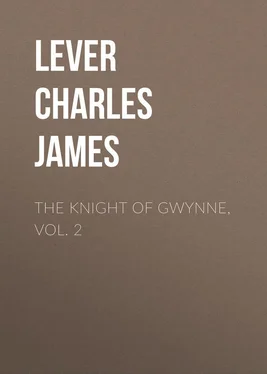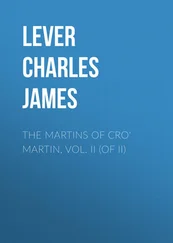Charles Lever - The Knight Of Gwynne, Vol. 2
Здесь есть возможность читать онлайн «Charles Lever - The Knight Of Gwynne, Vol. 2» — ознакомительный отрывок электронной книги совершенно бесплатно, а после прочтения отрывка купить полную версию. В некоторых случаях можно слушать аудио, скачать через торрент в формате fb2 и присутствует краткое содержание. Жанр: foreign_antique, foreign_prose, на английском языке. Описание произведения, (предисловие) а так же отзывы посетителей доступны на портале библиотеки ЛибКат.
- Название:The Knight Of Gwynne, Vol. 2
- Автор:
- Жанр:
- Год:неизвестен
- ISBN:нет данных
- Рейтинг книги:4 / 5. Голосов: 1
-
Избранное:Добавить в избранное
- Отзывы:
-
Ваша оценка:
- 80
- 1
- 2
- 3
- 4
- 5
The Knight Of Gwynne, Vol. 2: краткое содержание, описание и аннотация
Предлагаем к чтению аннотацию, описание, краткое содержание или предисловие (зависит от того, что написал сам автор книги «The Knight Of Gwynne, Vol. 2»). Если вы не нашли необходимую информацию о книге — напишите в комментариях, мы постараемся отыскать её.
The Knight Of Gwynne, Vol. 2 — читать онлайн ознакомительный отрывок
Ниже представлен текст книги, разбитый по страницам. Система сохранения места последней прочитанной страницы, позволяет с удобством читать онлайн бесплатно книгу «The Knight Of Gwynne, Vol. 2», без необходимости каждый раз заново искать на чём Вы остановились. Поставьте закладку, и сможете в любой момент перейти на страницу, на которой закончили чтение.
Интервал:
Закладка:
“You have put a very strong case,” said O’Reilly; “perhaps I should think it stronger, if I had not heard most of the arguments before, from yourself, and know by this time how their application to me has not sustained your prophecy.”
“I am ready to discuss that with you, too,” said Heffer-nan. “I know how it all happened: had I been with you the day you dined with Castlereagh, the misunderstanding never could have occurred; but there was a fatality in it all. Come,” said he, familiarly, and he slipped his arm, as he spoke, within O’Reilly’s, “I am the worst diplomatist in the world, and I fear I never should have risen to high rank in the distinguished corps of engineers if such had been my destination. I can lay down the parallels and the trenches patiently enough, I can even bring up my artillery and my battering-train, but, hang it! somehow, I never can wait for a breach to storm through. The truth is, if it were not for a very strong feeling on the subject I have just spoken of, you never would have seen me here this day. No man is happier or prouder to enjoy your hospitality than I am, but I acknowledge it was a higher sentiment induced me to accept your invitation. When your note reached me, I showed it to Castlereagh.
“‘What answer have you sent?’ said he.
“‘Declined, of course,’ said I.
“‘You are wrong, Heffernan,’ said his Lordship, as he took from me the note which I held ready sealed in my hand; ‘in my opinion, Heffernan, you are quite wrong.’
“‘I may be so, my Lord; but I confess to you I always act from the first impulse, and if it suggests regret afterwards, it at least saves trouble at the time.’
“‘Heffernan,’ said the Secretary, as he calmly read over the lines of your letter, ‘there are many reasons why you should go: in the first place, O’Reilly has really a fair grudge against us, and this note shows that he has the manliness to forget it. Every line of it bespeaks the gentleman, and I ‘ll not feel contented with myself until you convey to him my own sorrow for what is past, and the high sense I entertain of his character and conduct.’
“He said a great deal more; enough, if I tell you he induced me to rescind my first intention, and to become your guest; and I may say that I never followed advice the consequences of which have so thoroughly sustained my expectations.”
“This is very flattering,” said O’Reilly; “it is, indeed, more than I looked for; but, as you have been candid with me, I will be as open with you: I had already made up my mind to retire, for a season at least, from politics. My father, you know, is a very old man, and not without the prejudices that attach to his age; he was always averse to those ambitious views a public career would open, and a degree of coldness had begun to grow up between us in consequence. This estrangement is now happily at an end; and in his consenting to our present mode of life and its expenditure, he is, in reality, paying the recompense of his former opposition. I will not say what changes time may work in my opinion or my line of acting; but I will pledge myself that, if I do resume the path of public life, you are the very first man I will apprise of the intention.”
A cordial shake-hands ratified this compact; and Heffer-nan, who now saw that the fortress had capitulated, only stipulating for the honors of war, was about to add something very complimentary, when Beecham O’Reilly galloped up, with his horse splashed and covered with foam.
“Don’t you want to hear O’Halloran, Mr. Heffernan?” cried he.
“Yes, by all means.”
“Come along, then; don’t lose a moment; there’s a phaeton ready for you at the door, and if we make haste, we’ll be in good time.”
O’Reilly whispered a few words in his son’s ear, to which the other replied, aloud, —
“Oh! quite safe, perfectly safe. He was obliged to join his regiment, and sail at a moment’s notice.”
“Young Darcy, I presume?” said Heffernan, with a look of malicious intelligence. But no answer was returned, and O’Reilly continued to converse eagerly in Beecham’s ear.
“Here comes the carriage, Mr. Heffernan,” said the young man; “so slip in, and let’s be off.” And, giving his horse to a servant, he took his seat beside Heffernan, and drove off at a rapid pace towards the town.
After a quick drive of some miles, they entered the town, and had no necessity to ask if O’Halloran had begun his address to the jury. The streets which led to the square before the court-house, and the square itself, was actually crammed with country-people, of all sexes and ages; some standing with hats off, or holding their hands close to their ears, but all, in breathless silence, listening to the words of the Counsellor, which were not less audible to those without than within the building.
Nothing short of Beecham O’Reilly’s present position in the county, and the fact that the gratification they were then deriving was of his family’s procuring for them, could have enabled him to force a passage through that dense crowd, which wedged up all the approaches. As it was, he could only advance step by step, the horses and even the pole of the carriage actually forcing the way through the throng.
As they went thus slowly, the rich tones of the speaker swelled on the air with a clear, distinct, and yet so soft and even musical intonation that they fell deeply into the hearts of the listeners. He was evidently bent as much on appealing to those outside the court as to the jury, for his speech was less addressed to the legal question at issue than to the social condition of the peasantry; the all but absolutism of a landlord, – the serf-like slavery of a tenantry, dependent on the will or the caprice of the owners of the soil! With the consummate art of a rhetorician, he first drew the picture of an estate happily circumstanced, a benevolent landlord surrounded by a contented tenantry, the blessings of the poor man, “rising like the dews of the earth, and descending again in rain to refresh and fertilize the source it sprang from.” Not vaguely nor unskilfully, but with thorough knowledge, of his subject, he descanted on the condition of the peasant, his toils, his struggles against poverty and sickness borne with long-suffering and patience, from the firm trust that, even in this world, his destinies were committed to no cruel or unfeeling taskmaster. Although generally a studied plainness and even homeliness of language pervaded all he said, yet at times some bold figure, some striking and brilliant metaphor, would escape him, and then, far from soaring – as it might be suspected he had – above the comprehension of the hearers, a subdued murmur of delight would follow the words, and swelling louder and louder, burst forth at last into one great roar of applause. If a critical ear might cavil at the incompleteness or inaptitude of his similes, to the warm imagination and excited fancy of the Irish peasant they had no such blemishes.
It was at the close of a brilliant peroration on this theme, that Heffernan and Beecham O’Reilly reached the courthouse, and with difficulty forcing their way, obtained standing-room near the bar.
The orator had paused, and turning round he caught Beecham’s eye: the glance exchanged was but of a second’s duration, but, brief as it was, it did not escape Heffernan’s notice, and with a readiness he knew well how to profit by, he assumed a quiet smile, as though to say that he, too, had read its meaning. The young man blushed deeply; whatever his secret thoughts were, he felt ashamed that another should seem to know them, and in a hesitating whisper, said, —
“Perhaps my father has told you – ”
A short nod from Heffernan – a gesture to imply anything or nothing – was all his reply, and Beecham went on, —
Читать дальшеИнтервал:
Закладка:
Похожие книги на «The Knight Of Gwynne, Vol. 2»
Представляем Вашему вниманию похожие книги на «The Knight Of Gwynne, Vol. 2» списком для выбора. Мы отобрали схожую по названию и смыслу литературу в надежде предоставить читателям больше вариантов отыскать новые, интересные, ещё непрочитанные произведения.
Обсуждение, отзывы о книге «The Knight Of Gwynne, Vol. 2» и просто собственные мнения читателей. Оставьте ваши комментарии, напишите, что Вы думаете о произведении, его смысле или главных героях. Укажите что конкретно понравилось, а что нет, и почему Вы так считаете.












